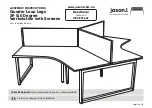
18 | minnkotamotors.com
©2017 Johnson Outdoors Marine Electronics, Inc.
BATTERY & WIRING INSTALLATION
BOAT RIGGING & PRODUCT INSTALLATION
For safety and compliance reasons, we recommend that you follow American Boat and Yacht Council (ABYC) standards when rigging
your boat. Altering boat wiring should be completed by a qualified marine technician. The following specifications are for general
guidelines only.
Max Amp Draw
Circuit Breaker
Wire Extension Length
5 feet
10 feet
15 feet
20 feet
25 feet
30 Amps
30 Amp @ 12 VDC
10 AWG
10 AWG
8 AWG
6 AWG
4 AWG
CONDUCTOR GAUGE AND CIRCUIT BREAKER SIZING TABLE
This conductor and circuit breaker sizing table is only valid for the following assumptions:
1. No more than 2 conductors are bundled together inside of a sheath or conduit outside of engine spaces.
2. Each conductor has 105° C temp rated insulation.
3. No more than 5% voltage drop allowed at full power based on published product power requirements.
NOTICE:
Wire Extension Length refers to the distance from the batteries to the Talon leads. Maximum Amp Draw values only
occur intermittently during select conditions and should not be used as continuous amp load ratings.
Reference
United States Code of Federal Regulations: 33 CFR 183 – Boats and Associated Equipment ABYC E-11: AC and DC Electrical Systems on Boats
CAUTION
Please read the following information before connecting your Talon(s) to your battery in order to avoid damaging your product and/or
voiding your warranty.
CAUTION
These guidelines apply to general rigging to support your Minn Kota product. Powering multiple Talons or additional electrical devices
from the same power circuit may impact the recommended conductor gauge and circuit breaker size. If you are using wire longer than
that provided with your unit, follow the conductor gauge and circuit breaker sizing table below. If your wire extension length is more
than 25 feet, we recommend that you contact a qualified marine technician.
CAUTION
An over-current protection device (circuit breaker or fuse) must be used. Coast Guard requirements dictate that each ungrounded
current-carrying conductor must be protected by a manually reset, trip-free circuit breaker or fuse. The type (voltage and current rating)
of the fuse or circuit breaker must be sized accordingly. The table below gives recommended guidelines for circuit breaker sizing.
















































